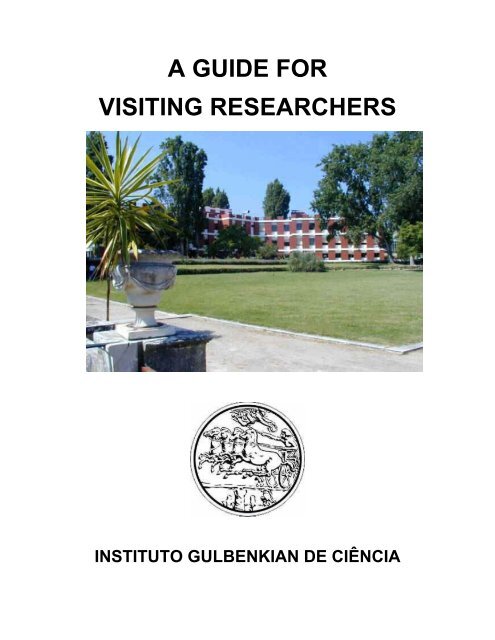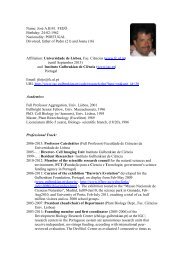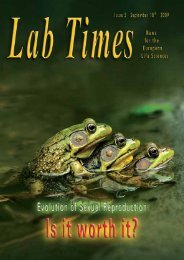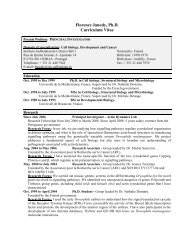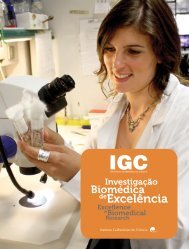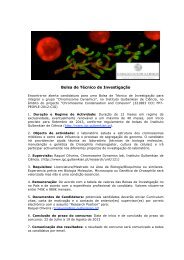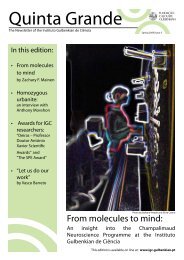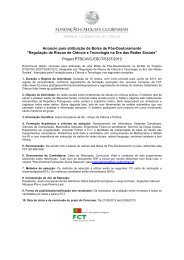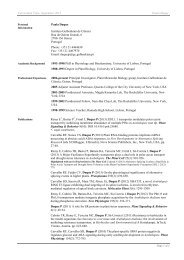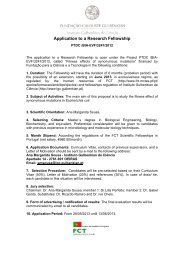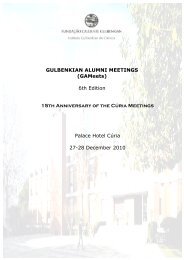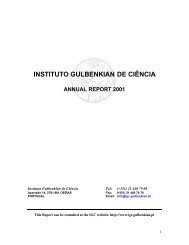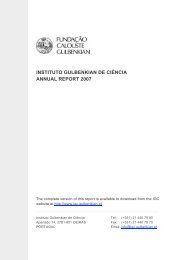a guide for visiting researchers - the Instituto Gulbenkian de Ciência ...
a guide for visiting researchers - the Instituto Gulbenkian de Ciência ...
a guide for visiting researchers - the Instituto Gulbenkian de Ciência ...
- No tags were found...
Create successful ePaper yourself
Turn your PDF publications into a flip-book with our unique Google optimized e-Paper software.
CONTENTSTHE INSTITUTO GULBENKIAN DE CIÊNCIA(IGC)Rua da Quinta Gran<strong>de</strong> 6, 2780-156 OeirasTelephone: + 351-21-4407900Fax: + 351-21-4407970E-mail: info@igc.gulbenkian.ptWeb: http://www.igc.gulbenkian.ptWHO WE ARE 7ooDirectorDeputy DirectorUNITS AND SERVICES 7ooooooooCell Imaging UnitGenomics UnitTransgenics UnitBioin<strong>for</strong>matics UnitIn<strong>for</strong>matics UnitTeaching UnitAnimal FacilityLibraryIGC – GENERAL INFORMATION 11ooooooooooRegistrationGeneral secretariatDeclarationsE-mail account and o<strong>the</strong>r in<strong>for</strong>matics servicesIGC IntranetTravel and accommodation arrangementsInsurancesLibraryMaintenance of scientific equipmentGeneral maintenanceIGC- PRACTICAL INFORMATION 13oooooTelephonesFaxesPhotocopiesCafeteriaCar parkingIGC- OTHER INFORMATION 14oRenewal of visas3
ooooApplications to fellowships and grantsIGC guest and internal seminarsValuablesChildrenGETTING TO THE IGC 15ooooArrival by airArrival by trainArrival by roadMapsGENERAL GUIDE FOR VISITORSTHIS IS PORTUGAL 19oooooooFast factsGeographyClimateHistoryCultureLanguageReligionTHE TOWN OF LISBON 21PLANNING YOUR STAY IN PORTUGAL 21ooooooPassport and visaVaccinationsResi<strong>de</strong>nce permit and work permitInsurancesAccommodationCustomsTRANSFERRING MONEY 22oOpening a bank accountINCOME TAXES 23oGeneral overviewPENSIONS 23ACCOMODATION 23oooAverage costsRent contractsHouse-buying4
ooExtra chargesProperty taxHEALTH 24ooooooStructureDoctorsHospitalsE-<strong>for</strong>msPrivate medical and <strong>de</strong>ntal care in <strong>the</strong> IGC neighbourhoodPharmacies and chemistsSCHOOL FOR THE CHILDREN 26oooGeneral overviewKin<strong>de</strong>rgartenInternational schoolsPRIVATE LIFE 27ooBirthMarriagePUBLIC AND PRIVATE TRANSPORT 28oooooUrban and public transportTaxisTrainsFlightsDriving in PortugalCOMMUNICATIONS 30oooPost officeTelephoneTelevisionSHOPPING 30oooShopping hoursDepartment stores, shopping malls and supermarketsMarketsLEISURE TIME ACTIVITIES 31ooooooooooWalking tours in LisbonMuseumsOceanárioClassical music, opera & balletCinemasGolfTennisSwimmingSpectator sportDisco & clubs5
GOOD TO KNOW 33o Timeo Electricityo Weights & measureso Tippingo No smokingo Toiletso National public holidayso In case of emergency – Dial 112The purpose of this booklet is twofold: (1) to be a <strong>gui<strong>de</strong></strong> when you are planning and preparing togo to <strong>the</strong> IGC and (2) to be a practical handbook when you have arrive and settled here.You will certainly meet aspects of life in Portugal not covered in this <strong>gui<strong>de</strong></strong>, but we hope that itwill be useful when you feel a little lost among <strong>the</strong> many rules and <strong>de</strong>tails coming in your waywhile you are planning your stay and after you have settled in Portugal. Although every ef<strong>for</strong>thas been ma<strong>de</strong> to ensure that <strong>the</strong> in<strong>for</strong>mation is correct, changes may occur after publication.If you would like to have fur<strong>the</strong>r assistance or need any kind of in<strong>for</strong>mation, you can alwayscontact <strong>the</strong> IGC Direction Secretariat.6
THE INSTITUTO GULBENKIAN DE CIÊNCIAWHO WE AREThe <strong>Instituto</strong> <strong>Gulbenkian</strong> <strong>de</strong> Ciência (IGC) was foun<strong>de</strong>d and is supported by <strong>the</strong> FundaçãoCalouste <strong>Gulbenkian</strong> (FCG) to carry on biomedical research and education.The Institute's scientific interests are focused on <strong>the</strong> genetic basis of <strong>de</strong>velopment and evolutionof complex systems, privileging organism-centred approaches in experimental mo<strong>de</strong>ls. The IGCis located in <strong>the</strong> campus of Oeiras, a suburb west of Lisbon. The campus inclu<strong>de</strong>s o<strong>the</strong>r basicand applied research institutions in biology, biotechnology and chemistry (<strong>the</strong> Institute <strong>for</strong>Chemical and Biological Technology – ITQB of <strong>the</strong> New University of Lisbon, <strong>the</strong> Institute <strong>for</strong>Experimental Biology and Technology - IBET, and <strong>the</strong> National Agronomical Station – EAN, of<strong>the</strong> Ministry <strong>for</strong> Agriculture) with complementary interests and competencies: protein structureand <strong>de</strong>sign, syn<strong>the</strong>sis and <strong>the</strong>ory of chemicals with biological interest, molecular microbiology,plant biotechnology, fermentation, downstream processing, etc).DIRECTORAntónio CoutinhoDEPUTY DIRECTORJosé Mário LeiteJosé Mário Leite is responsible <strong>for</strong> all matters concerning financial administration, generalmaintenance and telephone communications.Direction Secretariat:Ana Paula Pires (Ext. 201) and Greta Martins (Ext. 643)UNITS AND SERVICESCELL IMAGING UNITHeads of Unit:José FeijóResearch Assistants:Rosa Maria Santos (Monoclonal Antibody Production, Labelling)Nuno Moreno (Confocal microscopy, Image Analysis)Gabriel Martins (Confocal microscopy, Image Analysis)Rui Gardner (Flowcytometry)The Cell Imaging Unit provi<strong>de</strong>s cell and tissue imaging facilities, as well as flowcytometry andhistology services. The Unit also provi<strong>de</strong>s services in antibody purification and labelling and7
hybridoma tissue culture. The usage of most of <strong>the</strong> equipment is in self-service, however,technical assistance is provi<strong>de</strong>d where necessary.The following services are available:Flowcytometry ServiceThe Flowcytometry Service is equipped with <strong>the</strong> following instruments:• Moflo HighSpeed 8 Color 3 Laser Cell sorter• FacsAria HighSpeed Cell Sorter• FACSCalibur 4C• FACScan 3CImaging ServiceThe Imaging Service is equipped with <strong>the</strong> following instruments:• Jeol 100CX Transmission Electron Microscope• Bio-Rad MRC 1024 Confocal and MultiPhoton Microscope• Zeiss LSM510/Meta• Leica SP5 Confocal Microscope• Leica DMRA2 Fluorescent Microscope with a Photometrics SNAP HQ Cooled CCDCamera and Metamorph Imaging Software• Two conventional (Olympus, Leitz) Fluorescent Microscopes• Molecular Dynamics PhosphoImager• Olympus DIC/phasecontrast Microscope• PowerMac G4 Image Analysis Worstations• Roche Light Cycler• Varian Spectofluorimeter• Antibody Purification and Labelling System and hybridoma Tissue CultureHISTOLOGY UNITHead of Unit:Miguel SoaresResearch Assistant:Marisa PardalThe Histology Service provi<strong>de</strong>s assistance to scientists in processing tissue samples <strong>for</strong> routinehistochemical and in situ hybridization procedures at both <strong>the</strong> light and electron microscopicallevels.GENOMICS UNITHead of Unit:Carlos Penha GonçalvesResearch AssitantsIsabel Marques (Lab manager)Julia Lobato (Gene expression)Paulo Almeida (Bioin<strong>for</strong>matics)João Costa (Genotyping)8
The Genomics Unit provi<strong>de</strong>s technological support in three areas:The Genotyping Service, offers Sequenom MALDI-TOF technology allowing SNP genotypingassays with up to twenty eight SNPs assayed simultaneously. Taqman technology is available<strong>for</strong> SNP genotyping and Real-Time PCR.The Gene Expression Service, offers high-<strong>de</strong>nsity array technology <strong>for</strong> gene expression andgenome-wi<strong>de</strong> SNP genotyping using <strong>the</strong> latest Affimetrix Scanning Station.DNA Sequencing, offers DNA sequencing and fragment analysis using both multi-capillary andslab-gel electrophoresis.TRANSGENICS UNITHead of Unit:Moises MalloTechnician:Ana Nóvoa (Microinjection)The Trangenics Unit provi<strong>de</strong>s transgenic services to <strong>the</strong> research staff. Both, classictransgenics, pronuclear microinjection, and gene targeting, blastocyst injection, are offered as aservice. The unit also offers <strong>the</strong> cryopreservation of embryos <strong>for</strong> long term storage.BIOINFORMATICS UNITHead of Unit:José LealScientific Staff:Pedro Fernan<strong>de</strong>sAna Sofia OliveiraResearch Assitants:Isabel MarquesThe Bioin<strong>for</strong>matics Unit provi<strong>de</strong>s <strong>the</strong> following services:• Direct user support in biological data analysis using computational methods.• Conduct research and <strong>de</strong>velopment in bioin<strong>for</strong>matics, in particular in data-flows, datawarehousing and data analysis.• Develop and maintain an infra-structure <strong>for</strong> high per<strong>for</strong>mance bio-computing.• Support <strong>the</strong> IGC Graduate Programmes.Hosts <strong>for</strong> PEN (Portuguese no<strong>de</strong> of <strong>the</strong> European Molecular Biology network – EMBnet) since1992.INFORMATICS UNITHead of Unit:João SousaSystems Administrator:João Garcia9
Technicians:Ana Maya (Software)Manuel Carvalho (Hardware)The In<strong>for</strong>matics Unit manages infra-structural computing, networking and telecommunicationsfacilities in <strong>the</strong> IGC.TEACHING UNITSecretary:Manuela Cor<strong>de</strong>iro (Ext. 210)Post-graduate education has always been a strong valence of <strong>the</strong> IGC, and this tradition hasbeen maintained through <strong>the</strong> establishment of <strong>the</strong> In-House PhD Programme (Director:Henrique Teotónio), <strong>the</strong> PhD Programme in Computational Biology (Director: Jorge Carneiro),<strong>the</strong> <strong>Gulbenkian</strong>/Champalimaud PhD Programme in Neuroscience (Director: Zachary Mainen)and <strong>the</strong> <strong>Gulbenkian</strong> Biology Courses (our international advance-course programme). The IGCalso organizes several o<strong>the</strong>r international courses, notably in <strong>the</strong> area of bioin<strong>for</strong>matics as wellas workshops. Teaching activities at <strong>the</strong> IGC are also directed at <strong>the</strong> teaching of biology insecondary schools and inclu<strong>de</strong> initiatives that aim at a better public un<strong>de</strong>rstanding of science.ANIMAL FACILITYHead of Unit:Jocelyne DemengeotSecretary:Ana Licia Pires (Ext. 507)The animal facility is a mo<strong>de</strong>rn SPF (specific pathogen free) breeding facility (30.000 mice). Thefacility maintains more than 100 different mouse strains, inbred, natural mutants, transgenics,knock-outs and congenics. The facility also has one axenic (germ-free) mouse colony andoffers, as a service, <strong>the</strong> re<strong>de</strong>rivation of animals to SPF conditions. The animal facility also hostsZebrafish (approximately 45 wild type and mutant lines) that are available to <strong>the</strong> scientific staff<strong>for</strong> research purposes.LIBRARYLibrarian:Margarida Meira (Ext. 506)The IGC Library houses a collection of 30 years of holdings of journals in <strong>the</strong> bio-medical area.Currently, it provi<strong>de</strong>s local access to more than 16.800 titles.10
IGC - GENERAL INFORMATIONREGISTRATIONAny person wishing to spend a training period at <strong>the</strong> IGC must apply personally to <strong>the</strong> Directorof <strong>the</strong> IGC, using <strong>the</strong> application <strong>for</strong>m inten<strong>de</strong>d <strong>for</strong> this purpose that can be found on ourwebsite: http://www.igc.gulbenkian.pt. This application must be received at least one monthbe<strong>for</strong>e <strong>the</strong> beginning of <strong>the</strong> training period.First day at <strong>the</strong> IGCOn <strong>the</strong> first day of your stay at <strong>the</strong> IGC you should contact Ana Paula Pires (Ext. 201).She will provi<strong>de</strong> you with <strong>the</strong> necessary <strong>for</strong>ms that need completing to obtain <strong>the</strong> IGC I<strong>de</strong>ntitycard, authorization <strong>for</strong> car parking, e-mail account and access to <strong>the</strong> Library.Any person spending a training period at <strong>the</strong> IGC pledges to abi<strong>de</strong> by <strong>the</strong> regulations en<strong>for</strong>cedat <strong>the</strong> IGC, pertaining especially to <strong>the</strong> organization of work, to general discipline, and tohygiene and safety.DECLARATIONSTo obtain a letter concerning <strong>the</strong> IGC and your work here, please contact Jorge Costa Ext. 248.E-MAIL ACCOUNT AND OTHER INFORMATICS SERVICESTo open an e-mail account and <strong>for</strong> any o<strong>the</strong>r in<strong>for</strong>mation regarding IGC in<strong>for</strong>matics servicesplease contact Ana Maya (Ext. 213) or Manuel Carvalho (Ext. 249).IGC INTRANETAna Maya (Ext. 213) will give you a password that will also allow you access to <strong>the</strong> IGC Intranet(at our website: http://www.igc.gulbenkian.pt <strong>for</strong> IGC users only) where you will find fur<strong>the</strong>rin<strong>for</strong>mation on:• Telephones and e-mails list• List of secretarial support• In<strong>for</strong>mation on fellowships• Rules on IGC Fellowships• Rules on <strong>the</strong> IGC internal PhD Programme• Safety Manuals• Risk of fire• Schedule of Telephone AttendanceTRAVEL AND ACCOMMODATION ARRANGEMENTSTravelLogistics <strong>for</strong> any travel abroad and hotel arrangements while staying at <strong>the</strong> IGC will be <strong>de</strong>altwith by Greta Martins (Ext. 643).Travel permissionAccording to operational rules, permission to travel (in Portugal or abroad) is to be granted by<strong>the</strong> IGC Director if travel expenses are to be charged to accounts managed by <strong>the</strong> IGC/FCG.11
This permission must be requested at least one week be<strong>for</strong>e travelling. Failure to complywith this rule implies absence of travel insurance and may result in our inability to refund <strong>the</strong>expenses involved.INSURANCESAcci<strong>de</strong>ntsThe IGC has an insurance <strong>for</strong> work acci<strong>de</strong>nts occurring within <strong>the</strong> premises. This insurance is<strong>for</strong> everybody working at <strong>the</strong> institute, including short-term visitors. In case of acci<strong>de</strong>nt pleasein<strong>for</strong>m Jorge Costa and <strong>the</strong> Direction of <strong>the</strong> Institute, as soon as possible, in or<strong>de</strong>r to notify <strong>the</strong>Insurance Company. Details regarding this insurance on acci<strong>de</strong>nts at work can be obtainedfrom Jorge Costa (Ext. 248).TravelThe IGC offers a travel insurance to all <strong>researchers</strong>, stu<strong>de</strong>nts and technicians (non-permanentstaff of <strong>the</strong> FCG) who travel ABROAD to participate in congresses, meetings, courses ortraining, IN REPRESENTATION OF THE IGC.It is stressed that any such travel abroad should be previously authorised by <strong>the</strong> Director. Tothis end, <strong>the</strong> researcher/stu<strong>de</strong>nts/technician, should draw up a proposal "proposta" with <strong>the</strong>following indications:• Name of congress, meeting, course or traineeship• Place of <strong>the</strong> congress, meeting , course or traineeship• Title of <strong>the</strong> presentation and authors of <strong>the</strong> work (inclu<strong>de</strong> a photocopy of <strong>the</strong> abstract)• Dates of <strong>de</strong>parture and arrival in PortugalProposals <strong>for</strong> stu<strong>de</strong>nts and technicians must also inclu<strong>de</strong> a written document from <strong>the</strong> HeadResearcher on <strong>the</strong> reason <strong>for</strong> travel.All proposals must be han<strong>de</strong>d in to Jorge Costa (Ext. 248) AT LEAST ONE WEEK BEFORETRAVELLING in or<strong>de</strong>r to be authorised by <strong>the</strong> IGC Director. Failure to comply with <strong>the</strong>se ruleswill imply that <strong>the</strong> researcher/stu<strong>de</strong>nt/technician will travel without insurance and, consequentlywill not be refun<strong>de</strong>d by <strong>the</strong> insurance company in case of illness or acci<strong>de</strong>nt abroad.LIBRARYLibrarian: Margarida Meira (Ext. 506)Library service hours are from 9.30 a.m. to 5.00 p.m., Monday to Friday.The IGC Library is situated on <strong>the</strong> first floor of building to <strong>the</strong> right of <strong>the</strong> main entrance and isavailable <strong>for</strong> references purposes. To gain access to <strong>the</strong> Library you have to registeryourself as an IGC Library user. Upon <strong>the</strong> issue of your IGC Library rea<strong>de</strong>r number you willreceive a card that allows access to <strong>the</strong> local photocopying machines <strong>for</strong> personal use only.This card is rechargeable at <strong>the</strong> Economato and you are required to return it upon suspensionof your activity at <strong>the</strong> IGC.MAINTENANCE OF SCIENTIFIC EQUIPMENTFor maintenance or repair of scientific equipment, please contact Ana Homem, Ext. 207.12
GENERAL MAINTENANCEFor general and electrical works, air conditioning and cold rooms and repairs contact Mr. Sousa(Ext. 250), <strong>for</strong> cleaning, contact Ms. Gomes (Ext. 262).IGC - PRACTICAL INFORMATIONTELEPHONESThe Telephone Operator, Teresa Sousa (Ext 9 or 355 / IGC general phone Nº. 21 4407900) ison duty from 9.00 a.m. to 5.00 p.m., Monday to Friday. When she is off duty, security staff (Ext.222) will answer phone calls.To access an external line please dial 0. For international long-distance calls, after <strong>the</strong> 0 dial 00followed by <strong>the</strong> country co<strong>de</strong>.You can receive external calls and messages directly on your phone extension, at all times,without going through <strong>the</strong> Telephone Operator. For example, if your phone extension is 237,your direct number, <strong>for</strong> external calls, is 4407937. Messages will also be accepted at 214407937 in a personal voice mailbox.If you have technical problems with your telephone, please contact Manuel Carvalho (Ext. 249).There is a card-operated telephone <strong>for</strong> outgoing calls in <strong>the</strong> Main Hall of <strong>the</strong> IGC. Cards can beobtained from any tobacconist.FAXESFaxes can be sent or received through <strong>the</strong> telephone operator (Fax Nº. 21 4407970) in <strong>the</strong> MainHall of <strong>the</strong> IGC. If you receive a fax, you will be notified by <strong>the</strong> telephone operator to pick it up.PHOTOCOPIESThere is a self-service photocopying machine on every floor of <strong>the</strong> main building and four cardoperatedphotocopying machines in <strong>the</strong> library. This card will be given to you by Ana PaulaPires (Ext. 201) when you register at <strong>the</strong> IGC.CAFETERIAThere is a cafeteria at <strong>the</strong> IGC where you can have breakfast, lunch or a snack (building, left to<strong>the</strong> main entrance of <strong>the</strong> Institute). It opens from 8.00 a.m. to 6.00 p.m., Monday to Friday. Inthis cafeteria you can also find coin-operated machines that provi<strong>de</strong> snacks and cold and hotdrinks 24 hours a day, 7 days a week.In <strong>the</strong> Library building, on <strong>the</strong> ground floor, ano<strong>the</strong>r cafeteria is located where you can havelunch or a snack. This is open from 9.00 a.m. to 6.00 p.m., Monday to Friday.CAR PARKINGOwing to <strong>the</strong> shortage of space, <strong>the</strong> Main Car Park (main entrance of IGC) is reserved <strong>for</strong> IGCpermanent staff and short-term visitors (maximum 1 day). However, cars may be parked, afterreceiving due authorisation from <strong>the</strong> Direction (see Jorge Costa Ext. 248), in <strong>the</strong> North CarPark, at <strong>the</strong> back of <strong>the</strong> cafeteria of <strong>the</strong> IGC.13
IGC - OTHER INFORMATIONRENEWAL OF VISASIf you need to renew your visa, please contact Ana Paula Pires (Ext. 201).APPLICATIONS TO FELLOWSHIPS AND GRANTSFor any administrative support regarding fellowships or grants applications please contactSheila Vidal (Ext. 202).IGC GUEST AND INTERNAL SEMINARSAlmost every week <strong>the</strong> IGC organizes a Guest and/or an Internal Seminar. These seminars areannounced, in due time, on <strong>the</strong> Board in <strong>the</strong> main entrance of <strong>the</strong> Institute. Internal Seminarsare generally held on Tuesdays at 12.00 p.m. and Guest Seminars on Fridays at 12.00 p.m.VALUABLESYou are strongly advised to keep your money and valuables with you AT ALL TIMES. The IGCcannot accept responsibility <strong>for</strong> your property and although <strong>the</strong> security staff keeps a closewatch, a number of losses have occurred.CHILDRENFor safety reasons children are not allowed on <strong>the</strong> IGC premises. The IGC cannot accept anyresponsibility <strong>for</strong> any acci<strong>de</strong>nt that could occur with children within <strong>the</strong> premises.14
GETTING TO THE IGCARRIVAL BY AIRTaxisOn arrival at <strong>the</strong> Lisbon airport, go to <strong>the</strong> visitors and Convention Bureau where <strong>the</strong>re is a TaxiVoucher Service from where you can get a Taxi without queuing. Bus / TrainThere is a shuttle bus service from Lisbon airport to railway station CAIS DO SODRÉ From Caisdo Sodré all trains stop at Oeiras, where <strong>the</strong> IGC is located.Instructions to get from Oeiras train station to <strong>the</strong> IGC: get out of <strong>the</strong> station on <strong>the</strong> si<strong>de</strong> where agas station (GALP) is located. Keeping to <strong>the</strong> right, cross over this gas station, and walk down<strong>the</strong> road until arrival at a set of traffic lights. Here, turn left again, cross over <strong>the</strong> pe<strong>de</strong>striancrossing and <strong>the</strong> IGC is <strong>the</strong> fenced-in area immediately after a pink house on <strong>the</strong> corner (thisroute takes around 3 minutes).ARRIVAL BY TRAINThe Sud-Express and <strong>the</strong> Lusitânia hotel-train provi<strong>de</strong> <strong>the</strong> main international connections,arriving / <strong>de</strong>parting from Lisbon and Porto.ARRIVAL BY ROADIt is possible to enter Portugal by road at several points along its bor<strong>de</strong>r with Spain.15
MAPS16
GENERAL GUIDE FOR VISITORSTHIS IS PORTUGALFAST FACTSFull country name: PortugalArea: 92,389 sq km (35,672 sq mi)Population: 10 millionCapital city: Lisbon (pop 535,740)People: 99% Portuguese, 1% AfricanLanguage: PortugueseReligion: 97% Roman Catholic, 2% Protestant, 1% o<strong>the</strong>rGovernment: Parliamentary <strong>de</strong>mocracyMember of EU: YesGEOGRAPHYPortugal lies immediately west of Spain, and is buffeted along its sou<strong>the</strong>rn coast by <strong>the</strong> AtlanticOcean. To its west and southwest lie <strong>the</strong> islands of <strong>the</strong> Azores and Ma<strong>de</strong>ira, far out in <strong>the</strong>Atlantic. It is one of Europe's smallest countries, measuring 560km (350mi) north to south and apaltry 220km (135mi) from east to west. The nor<strong>the</strong>rn and central regions are heavily populatedand characterised by rivers, valleys, <strong>for</strong>ests and mountains - <strong>the</strong> highest range is <strong>the</strong> Serra daEstrela, peaking at Torre (1993m/6540ft). The south is less populated and, apart from <strong>the</strong> rockybackdrop of <strong>the</strong> Algarve, much flatter and drier.The lush landscape of <strong>the</strong> north is rich viticultural country but also features corn, potato and rye.The central and sou<strong>the</strong>rn regions are less green, yet <strong>the</strong>y support corn oaks, olive groves,vineyards, and orange and fig trees, and are a <strong>de</strong>light in spring when <strong>the</strong> almond blossoms arein full bloom.CLIMATEPortugal's climate is temperate. The country is generally warm from April to October, thoughsomewhat less so in <strong>the</strong> north, while <strong>the</strong> sou<strong>the</strong>rn region of Algarve can experienceuncom<strong>for</strong>tably hot temperatures in midsummer. During winter, <strong>the</strong> north receives plenty of rainand temperatures can be chilly. Snowfall is common in <strong>the</strong> mountains, particularly <strong>the</strong> Serra daEstrela range.19
HISTORYPortugal's history goes back to <strong>the</strong> Celts, who settled <strong>the</strong> Iberian Peninsula around 700 BC. Theregion soon attracted a succession of peoples and was colonised by <strong>the</strong> Phoenicians, Greeks,Romans and Visigoths. In <strong>the</strong> 8th century, <strong>the</strong> Moors crossed <strong>the</strong> Strait of Gibraltar andcommenced a long occupation that introduced <strong>the</strong>ir culture, architecture and agriculturaltechniques to Portugal. But resistance to <strong>the</strong> Moors grew and <strong>the</strong>y were finally ejected during<strong>the</strong> 13th century.In <strong>the</strong> 15th century, Portugal entered a phase of overseas expansion due to <strong>the</strong> ef<strong>for</strong>ts of PrinceHenry <strong>the</strong> Navigator. Sailors set off to discover new tra<strong>de</strong> routes and helped create anenormous empire that, at its peak, exten<strong>de</strong>d to India, <strong>the</strong> Far East, Brazil and Africa. This periodmarked <strong>the</strong> apogee of Portuguese power and wealth, but it fa<strong>de</strong>d towards <strong>the</strong> end of <strong>the</strong> 16thcentury when Spain's Felipe II claimed <strong>the</strong> throne. Although Spanish rule lasted only a few<strong>de</strong>ca<strong>de</strong>s, <strong>the</strong> momentum of <strong>the</strong> empire <strong>de</strong>clined over <strong>the</strong> following centuries.At <strong>the</strong> close of <strong>the</strong> 18th century Napoleon sent expeditionary <strong>for</strong>ces to inva<strong>de</strong> Portugal but <strong>the</strong>ywere <strong>for</strong>ced back by <strong>the</strong> troops of <strong>the</strong> Anglo-Portuguese alliance. During <strong>the</strong> 19th century <strong>the</strong>economy faltered and republicanism took hold. National turmoil led to <strong>the</strong> abolition of <strong>the</strong>monarchy in 1910 and <strong>the</strong> founding of a <strong>de</strong>mocratic republic.Portugal's <strong>de</strong>mocratic phase lasted until 1926, when a military coup ushered in a long period ofdictatorship un<strong>de</strong>r António <strong>de</strong> Oliveira Salazar. His reign came to an end in 1968 when hesustained brain damage after falling off a chair. Anachronistic attempts to hold onto colonies in<strong>the</strong> face of nationalist in<strong>de</strong>pen<strong>de</strong>nce movements resulted in costly wars in Africa and led to <strong>the</strong>Revolution of <strong>the</strong> Carnations, a bloodless military coup on 25 April 1974.During <strong>the</strong> 1970s and early 1980s, Portugal un<strong>de</strong>rwent some painful adjustments: <strong>the</strong> politicalclimate vacillated between right and left, and <strong>the</strong> economy suffered from wrangles betweengovernment and private ownership. The granting of in<strong>de</strong>pen<strong>de</strong>nce to Portugal's African coloniesin 1974-75 resulted in a flood of over 500,000 refugees into <strong>the</strong> country. Entry into <strong>the</strong> EuropeanCommunity (EC) in 1986 restored some measure of stability, which was buttressed by <strong>the</strong>acceptance of Portugal as a full member of <strong>the</strong> European Monetary Union in 1999.CULTUREPortugal's architecture is renowned <strong>for</strong> its Moorish and surrealist flourishes, culminating in <strong>the</strong><strong>de</strong>velopment during <strong>the</strong> 16th century of <strong>the</strong> Manueline style characterised by <strong>the</strong> extravagantuse of twists, turns, spirals and nautical <strong>the</strong>mes <strong>for</strong> <strong>de</strong>coration. The nation's best-known musical<strong>for</strong>m is <strong>the</strong> melancholic fado (songs believed to have originated from <strong>the</strong> pinings of 16th-centurysailors), while traditional folk dancing remains popular in rural towns. The most striking craft is<strong>the</strong> making of <strong>de</strong>corative tiles known as azulejos, a technique <strong>the</strong> Portuguese learnt from <strong>the</strong>Moors. Portugal's rich literary tradition also has its origins in <strong>the</strong> 16th century, with <strong>the</strong>publication of works by <strong>the</strong> dramatist Gil Vicente and <strong>the</strong> poet Luís <strong>de</strong> Camões. Arguably <strong>the</strong>country's finest poet and dramatist to emerge in <strong>the</strong> 20th century is Fernando Pessoa.Portuguese food is cheap, <strong>de</strong>licious and served in gut-expanding portions. Classic Portuguesemeals inclu<strong>de</strong> sardinhas assadas (charcoal-grilled sardines), pastéis <strong>de</strong> bacalhau (codfishcakes) and caldo ver<strong>de</strong> (a soup of cabbage and potatoes). Seafood dishes such as linguadogrelhado (grilled sole) and bife <strong>de</strong> atúm (tuna steak) are appetising staples. Meals can bewashed down with Portugal's good-quality wines (vinhos) or port - <strong>the</strong> drink synonymous withPortugal.LANGUAGEPortuguese is <strong>the</strong> main language in Portugal and it is spoken by nearly 190 million of peopleworldwi<strong>de</strong>. While local resi<strong>de</strong>nts genuinely appreciate any attempt by visitors to speakPortuguese, about half of <strong>the</strong> Portuguese population has a working knowledge of English.20
RELIGIONAs freedom of religion is inclu<strong>de</strong>d in <strong>the</strong> constitution <strong>the</strong>re is no state religion in Portugal, butRoman Catholicism is <strong>the</strong> dominant faith, adhered to by roughly 95% of Portuguese.THE TOWN OF LISBONLisbon (Lisboa), <strong>the</strong> country's capital, stands breezily on <strong>the</strong> banks of <strong>the</strong> Rio Tejo. The city'slow skyline, unpretentious atmosphere and pleasant blend of architectural styles conspire tomake it a favourite with many visitors. Orientation is fairly straight<strong>for</strong>ward - apart from <strong>the</strong> puffrequired to negotiate <strong>the</strong> hills - with most of <strong>the</strong> daily activity centred in <strong>the</strong> lower part of <strong>the</strong> city.A clear choice <strong>for</strong> Lisbon's finest attraction is <strong>the</strong> Mosteiro dos Jerónimos. Construction beganabout 1502 and was completed towards <strong>the</strong> end of <strong>the</strong> century. It survived a great earthquake in1755, and is today <strong>the</strong> principal remnant of Manueline architecture found in <strong>the</strong> city. Nearby is<strong>the</strong> Torre <strong>de</strong> Belém, a Manueline-style tower which stands in <strong>the</strong> Rio Tejo, and is probably <strong>the</strong>most photographed monument in Portugal.Lisbon has a number of attractive museums, including <strong>the</strong> Museu Nacional do Azulejo, whichcontains superb displays of <strong>de</strong>corative tiles; <strong>the</strong> Museu Nacional <strong>de</strong> Arte Antiga, which houses<strong>the</strong> national collection of works by Portuguese painters; and <strong>the</strong> immense Museu Calouste<strong>Gulbenkian</strong>, consi<strong>de</strong>red <strong>the</strong> finest museum in Portugal, with exhibits of paintings, sculptures,carpets, coins and ceramics from around <strong>the</strong> world.O<strong>the</strong>r places of interest are <strong>the</strong> districts of Baixa and Alfama. Here you'll find some of <strong>the</strong> city'sol<strong>de</strong>st and most rewarding sights: anarchic cobbled streets, squares and alleys; markets andcraftspeople; and colourful buildings and brooding castles.Lisbon has a wi<strong>de</strong> range of budget accommodation and cheap restaurants, mostly found in <strong>the</strong>central parts of <strong>the</strong> city. Lisbon's nightlife is boisterous, and inclu<strong>de</strong>s drinking in bars, raving atdiscos, bopping to jazz and African rhythms or puzzling over fado. Local soccer matches andbullfights are <strong>the</strong> biggest thrills.PLANNING YOUR STAY IN PORTUGALPASSPORT AND VISAA valid passport is necessary when <strong>visiting</strong> Portugal. For EU citizens, it is sufficient with an IDcard provi<strong>de</strong>d <strong>the</strong> citizenship is stated on <strong>the</strong> card. Nationals of Canada, New Zealand and <strong>the</strong>USA can stay <strong>for</strong> up to 90 days in any half-year without a visa. Citizens of many countries,notably in Eastern Europe, Africa, Asia and Australia need a visa in or<strong>de</strong>r to be able to enterPortugal unless <strong>the</strong>y are <strong>the</strong> spouse or child of EU citizens. In<strong>for</strong>mation is available atPortuguese Embassies or Consulates.VACCINATIONSOn entry into Portugal, <strong>the</strong>re is generally no vaccination requirement. Temporary regulationsmay sometimes apply to travellers from specific countries.21
Personal cheques from abroad are not cashed at Portuguese banks. Though travellers chequesare easily exchanged, and at rates about 1% better than <strong>for</strong> cash, <strong>the</strong>y are very poor value inPortugal because additional fees are so high - sometimes up to 13% <strong>for</strong> a US$100 cheque. Theexception is American Express travellers cheques, which can be exchanged commission-freewith AmEx agents. Most credit cards, including American Express, Diner's Club, Eurocard,MasterCard and Visa are wi<strong>de</strong>ly accepted. Automated Teller Machines (ATMs), calledMultibanco, are found in all towns of any size where you can withdraw cash from credit and<strong>de</strong>bit accounts. These automated teller machines are generally tied to international networks,such as Cirrus and Plus.INCOME TAXESGENERAL OVERVIEWA percentage of your personal income is <strong>de</strong>ducted each month <strong>for</strong> tax and o<strong>the</strong>r purposes("retenção na fonte") and you are obliged to present a final statement of earnings andcontributions at <strong>the</strong> end of each year (Income tax is only <strong>for</strong> work contracts and not <strong>for</strong>fellowships). The percentage that is <strong>de</strong>ducted by your employer varies according to your incomeand your family status (single, married, with children, etc).This annual assessment must be ma<strong>de</strong> by <strong>the</strong> end of February or <strong>the</strong> middle of April, if you areself-employed.For more in<strong>for</strong>mation on taxes in Portugal consult <strong>the</strong> following website:- http://europa.eu.int/scadplus/citizens/en/inter.htmPENSIONSUn<strong>de</strong>r EU regulations if you work in two or more EU countries you will be able to combine statepension contributions paid in each state in or<strong>de</strong>r to qualify <strong>for</strong> a state pension. For morein<strong>for</strong>mation it is advisable to contact <strong>the</strong> Ministry of Social Security in your own country be<strong>for</strong>eyou leave <strong>for</strong> Portugal.The legal retirement age in Portugal is 65 <strong>for</strong> men and 65 <strong>for</strong> women (it is fixed a transitoryperiod of 6 years <strong>for</strong> this purpose, which increases 6 months every year). The qualifying periodis 15 years of paid or credited contributions. Old-age pensions are paid to all insured employees<strong>for</strong> each calendar year which is covered by paid contributions.ACCOMMODATIONIt is necessary to have accommodation available when you arrive in Oeiras. Note thatapartments are in high <strong>de</strong>mand and must be reserved well in advanceAVERAGE COSTSDue to <strong>the</strong> shortage of accommodation in <strong>the</strong> large cities and towns (Lisbon, Porto and Algarve)rents are ra<strong>the</strong>r expensive: <strong>for</strong> example, 1-2 bedroom apartments range from 500 Euros to 100023
Euros per month, while 4 bedroom apartments range from 1300 Euros to 1500 Euros permonth.Unfurnished apartments are not necessarily cheaper than furnished apartments.The purchase price of a house in Lisbon of 100 m² is between 150.000 and 300.000 Euros.RENT CONTRACTSThe minimum rental contract is usually 6 months. Accommodation can ei<strong>the</strong>r be furnished orunfurnished. However, this does not affect <strong>the</strong> price. If you are planning to stay <strong>for</strong> a longerperiod, it may be cheaper and easier to buy accommodation instead of renting accommodation,which is expensive and scarce.HOUSE-BUYINGMortgages can be arranged through banks. They vary according to <strong>the</strong> financial situation of <strong>the</strong>mortgagee and <strong>the</strong> location of <strong>the</strong> property. There are also variations between <strong>the</strong> differentbanks. Real estate acquisition tax normally amounts to 10 % of <strong>the</strong> purchase price. (You willneed a Portuguese fiscal number "cartão <strong>de</strong> contribuinte" - to buy property, which you musthave in any case <strong>for</strong> your income tax). A notary takes care of <strong>the</strong> whole house-buyingtransaction (escritura). In general, a temporary purchase contract (contrato promessa <strong>de</strong>compra e venda) will be signed be<strong>for</strong>e <strong>the</strong> "escritura" is finalised.EXTRA CHARGESWater is usually paid <strong>for</strong> on a monthly basis.Mains gas is only available in Lisbon, bottled gas is wi<strong>de</strong>ly used elsewhere.PROPERTY TAXThere is a local municipal tax (Contribuição Autárquica - CA) based on <strong>the</strong> value of <strong>the</strong>property, <strong>the</strong> <strong>de</strong>sirability of <strong>the</strong> location and <strong>the</strong> standards of local services. The value of this taxranges from 0,7% to 1.3%.HEALTHSTRUCTUREThe national health service is run by <strong>the</strong> "Ministério <strong>de</strong> Saú<strong>de</strong>" (Ministry of Health).Contributions to <strong>the</strong> national health system are <strong>de</strong>ducted directly from your pay. All personscovered by <strong>the</strong> general social security scheme are covered <strong>for</strong> health care.As soon as you take up employment a "Livrete <strong>de</strong> Assistência Médica" will be automaticallyissued to you by <strong>the</strong> state health centres (Centro <strong>de</strong> Saú<strong>de</strong>) or <strong>the</strong> regional centres(Administracões Regionais <strong>de</strong> Saú<strong>de</strong>) or directly from your employer.Regional social security offices (Centros Regionais <strong>de</strong> Segurança Social - CRSS) or <strong>the</strong> specialin<strong>for</strong>mation <strong>de</strong>partment <strong>for</strong> <strong>for</strong>eign nationals in Lisbon (Departamento <strong>de</strong> RelaçõesInternacionais e Convenções da Segurança Social) may be contacted <strong>for</strong> fur<strong>the</strong>r in<strong>for</strong>mation.Free emergency treatment is available to visitors/employment seekers but you shouldremember to bring appropriate E-<strong>for</strong>ms with you.24
DOCTORSThere is a free choice of doctors (general practitioners as well as specialists).No fees have to be paid <strong>for</strong> doctors working ei<strong>the</strong>r in health centres (Centro <strong>de</strong> Saú<strong>de</strong>) or un<strong>de</strong>ragreement between <strong>the</strong> Or<strong>de</strong>r of Medical Practitioners and <strong>the</strong> Ministry of Health.Treatment by <strong>de</strong>ntists is given on <strong>the</strong> same basis as medical treatment, that is, free of chargewhen <strong>the</strong> <strong>de</strong>ntist is working in a health centre or is on <strong>the</strong> Ministry of Health list.HOSPITALSHospital treatment within <strong>the</strong> health service (public hospitals and institutions approved by <strong>the</strong>Ministry of Health) is free (subject only to a flat-rate charge) and <strong>the</strong>re is free choice among<strong>the</strong>m. Private hospitals and clinics may be paid <strong>for</strong> by <strong>the</strong> national health service if publichospitals cannot provi<strong>de</strong> <strong>the</strong> required treatment within a period of 3 months.In a public hospital <strong>the</strong>re are no charges <strong>for</strong> a public ward or <strong>for</strong> a private room, whenrecommen<strong>de</strong>d by <strong>the</strong> doctor. If <strong>the</strong> private room is freely chosen, charges are payable in full.E-FORMS"E-<strong>for</strong>ms" are used to speed up <strong>the</strong> process of claiming social security benefits when you goabroad. They are standardized throughout <strong>the</strong> Union and can be obtained from <strong>the</strong> socialsecurity institutions of <strong>the</strong> country in which you are insured.When you arrive in ano<strong>the</strong>r country, you should present <strong>the</strong> appropriate <strong>for</strong>ms to <strong>the</strong> socialsecurity institution in or<strong>de</strong>r to speed up your claim <strong>for</strong> benefits. Generally, it is also useful tobring your passport or valid i<strong>de</strong>ntity card <strong>for</strong> i<strong>de</strong>ntification purposes, a copy of your birthcertificate and copies of any o<strong>the</strong>r appropriate documents such as proof of marriage or a child'sbirth certificate.To prove you are covered in your own country, Form E 111 must be carried. You are <strong>the</strong>nentitled to urgent treatment <strong>for</strong> acci<strong>de</strong>nt or unexpected illness. This only covers temporary stayswith a maximum of 1 year (or, exceptionally, 2 years if on secondment).For more in<strong>for</strong>mation concerning “E-<strong>for</strong>ms” consult <strong>the</strong> following website:- http://europa.eu.int/scadplus/citizens/en/pt/1100.htmPRIVATE MEDICAL AND DENTAL CARE IN THE IGC NEIGHBOURHOODYou can ask one of <strong>the</strong> Secretaries of <strong>the</strong> General secretariat to book you an appointment <strong>for</strong> aGP or a specialist (English speaking doctors) at <strong>the</strong> following Private General Clinics:Clínica EuropaRua <strong>de</strong> Catembe, 107, 2775 CarcavelosTel. 21 4569780/ 21 4578946Opens from 8.30 a.m. to 7.00 p.m., Monday to Friday and Saturday from 9.00 a.m. to 1.00 p.m.After normal working hours <strong>the</strong>re is a permanent on-call service (GP, Pediatrician, Dental careand home visits) you will be directed to an answering machine which will give you <strong>the</strong> telephonenumber of <strong>the</strong> Doctors on duty).25
Clínica Médica Internacional <strong>de</strong> CascaisRua do Regimento 19, nº. 67-2ºTel. 21 484 53 17Opens from 9.00 a.m. to 1.00 p.m. and from 2.00 p.m. to 7.00 p.m., Monday to Friday. Closedon weekends. There is a 24-hour service, 7 days a week (GP and specialists, home visits).Note (1): An appointment <strong>for</strong> <strong>the</strong> GP, at <strong>the</strong> private clinics, will cost approximately 50 Euros.Note (2): A Personal Health Insurance Plan will cost you approximately 500 Euros/year.PHARMACIES OR CHEMISTSMedical prescriptions should be taken to a pharmacy. You find <strong>the</strong>m un<strong>de</strong>r <strong>the</strong> headingFARMÁCIA. Most of <strong>the</strong>m open from 9.00 a.m. to 1.00 p.m. and 3.00 p.m. to 7.00 p.m. Mondayto Friday and Saturday morning, from 9.00 a.m. to 1.00 p.m. To find a 24 hours open pharmacy,check <strong>the</strong> list posted on <strong>the</strong> door of a closed one or check a portuguese daily newspaper.Near <strong>the</strong> IGC, <strong>the</strong>re is a pharmacy situated in front of <strong>the</strong> Oeiras Railway Station (2 minuteswalk).For homeopathic remedies, you could try Farmácia Homeopática Santa Justa at Rua SantaJusta 6, in Lisbon.SCHOOL FOR THE CHILDRENGENERAL OVERVIEWThe political body responsible <strong>for</strong> <strong>the</strong> education system is Ministério da Educação (Ministry ofEducation).Pre-school education is not compulsory and is <strong>de</strong>dicated to children aged between 3 and 6years. It exists in <strong>the</strong> public and in <strong>the</strong> private sector although <strong>the</strong> private sector schools aremore expensive.Elementary education is universal and compulsory and comprises 3 sequential cycles over atotal of 9 years (from 6 years until 15 years of age). Also at this level, it is possible to choosebetween <strong>the</strong> public schools (free) and private ones. In <strong>the</strong> private sector, international schoolsare also available.Secondary education is organised in two different sectors: one covers normal secondary schooleducation and <strong>the</strong> o<strong>the</strong>rs are <strong>the</strong> so-called professional schools. Both types of schooling canlead to <strong>the</strong> qualifications necessary <strong>for</strong> entrance to university, although generally speaking, <strong>the</strong>professional schools are much more oriented towards qualifications <strong>for</strong> working life.In higher education, it is possible to choose between <strong>the</strong> universities (courses of between 4 and6 years in length) and polytechnics, with courses more oriented to professional working life.For more in<strong>for</strong>mation on <strong>the</strong> education system in Portugal consult <strong>the</strong> following websites:- http://europa.eu.int/scadplus/citizens/en/inter.htm- http://www.ul.pt/Guia_est_estrangeiro/ingles.htm26
KINDERGARTENPre-school education is optional. It is provi<strong>de</strong>d in "Jardins <strong>de</strong> Infancia" (nursery schools) by awi<strong>de</strong> variety of State organisations, by charitable institutions, by private and cooperativeschools, and by unions and o<strong>the</strong>r organisations.INTERNATIONAL SCHOOLSInternational schools are available in Lisbon but <strong>the</strong>y are very expensive and <strong>the</strong> numbers arevery restricted. For more in<strong>for</strong>mation on international schools consult <strong>the</strong> following websites:- http://europa.eu.int/scadplus/citizens/en/pt/107930.htm- http://www.britishcouncilpt.org/education/ischools.htm- http://www.ealisboa.com/pt/kontakt.htmPRIVATE LIFEBIRTHThe registration of a child should be ma<strong>de</strong> in <strong>the</strong> 20 days after <strong>the</strong> birth in <strong>the</strong> Registration office(Conservatória do Registo Civil), preferably in <strong>the</strong> commune in which <strong>the</strong> birth has occurred; itis, however, possible to register at any Office and <strong>the</strong> competent services arrange <strong>for</strong> <strong>the</strong>transfer to <strong>the</strong> correct one. The registration can be ma<strong>de</strong> by ei<strong>the</strong>r of <strong>the</strong> parents or by both.The name chosen <strong>for</strong> <strong>the</strong> child should be in Portuguese or adapted to it, unless one of <strong>the</strong>parents is not Portuguese (in this case <strong>for</strong>eign names can be used).The parents should bring <strong>the</strong>ir i<strong>de</strong>ntity cards and it is also advisable to bring also <strong>the</strong> healthbulletin of <strong>the</strong> child.MARRIAGEIt is possible to have two types of marriage: <strong>the</strong> catholic and <strong>the</strong> civil. The procedures to takeinto account are <strong>the</strong> same <strong>for</strong> both types. If a catholic marriage is chosen, it is necessary tocontact <strong>the</strong> church. The current restrictions to marriage are: it is only possible <strong>for</strong> persons ofdifferent sexes and <strong>the</strong> minimum age to marry is 16 years old, subject to parents' authorisation.O<strong>the</strong>r restrictions relate to familial relations and <strong>the</strong> time period between divorce andremarriage.To start <strong>the</strong> marriage process, it is necessary to go to a Registration Office (Conservatória doRegisto Civil) in which one of <strong>the</strong> parties concerned lives, with <strong>the</strong> following documents:• birth certificate ("Certidão <strong>de</strong> Nascimento") of both;• I<strong>de</strong>ntity cards of both or passportsThe names of <strong>the</strong> partners are <strong>the</strong>n put in <strong>the</strong> respective Junta <strong>de</strong> Freguesia <strong>for</strong> publicconsultation <strong>for</strong> a month. If <strong>the</strong>re are any reasons why <strong>the</strong> marriage should not take place, <strong>the</strong>competent authority should be in<strong>for</strong>med during this period. After this <strong>for</strong>mality, <strong>the</strong> marriage cantake place. It is necessary to have two witnesses <strong>for</strong> <strong>the</strong> marriage.27
PUBLIC AND PRIVATE TRANSPORTURBAN PUBLIC TRANSPORTIn <strong>the</strong> main towns <strong>the</strong>re is a complete public transport network. In Lisboa <strong>the</strong>re are buses, <strong>the</strong>un<strong>de</strong>rground, and trams. One may also use public elevators (lifts). Tourism In<strong>for</strong>mation Pointsat Carris (Lisboa) and STCP (Porto) sell tourist tickets every business day from 8 am to 8 pm.TAXISThese are painted mostly cream with a roof-light to i<strong>de</strong>ntify <strong>the</strong>m. However, <strong>the</strong>re are still sometaxis which keep <strong>the</strong> old colours, green and black. In towns <strong>the</strong>y use taximeters, but onceoutsi<strong>de</strong> urban boundaries <strong>the</strong> service is charged by <strong>the</strong> kilometre, and inclu<strong>de</strong>s <strong>the</strong> price of <strong>the</strong>driver’s return trip to his starting point. From 10 pm to 6 am <strong>the</strong> rate increases by 20%. It isnormal to give a tip of 10% on top of <strong>the</strong> fare. Luggage weighing more than 30 kg is chargedaccording to a fixed rate. All taxis have an updated chart in two languages.At <strong>the</strong> IGC a reliable Taxi service may be obtained from Radio-Taxis Concelho <strong>de</strong> Oeiras (Tel.21 4411214).TRAINSExpress trains between Lisbon and Porto stop in Coimbra (Alfa trains), while regional trains(Intercida<strong>de</strong>s and Inter-regional) connect <strong>the</strong> different parts of Portugal. These trains have firstand second class carriages, except <strong>for</strong> local and suburban trains, where <strong>the</strong>re is only one class.Special tickets - including tourist tickets valid <strong>for</strong> 7, 14 or 21 days, may be bought, while <strong>the</strong>reare special return ticket discounts on “blue days” <strong>for</strong> trips exceeding 100 km.In Lisbon area, Fertagus runs <strong>the</strong> rail connection between <strong>the</strong> two banks of River Tagus,crossing <strong>the</strong> Bridge. The train leaves at Entrecampos station (in Lisbon) up to <strong>the</strong> terminus atFogueteiro (on <strong>the</strong> south bank).A reliable railway line operates from Lisbon (Cais do Sodré) to Cascais from 5.30 a.m. to 3.10a.m, 7 days a week. The closest railway station to <strong>the</strong> IGC is OEIRAS (2-minute walk from <strong>the</strong>IGC). At peak hours, <strong>the</strong>re are trains running every 5-10 minutes.FLIGHTSFlights insi<strong>de</strong> Portugal are expensive and hardly worth consi<strong>de</strong>ring, given <strong>the</strong> short distancesinvolved. A domestic <strong>de</strong>parture tax is levied, but it's inclu<strong>de</strong>d in <strong>the</strong> price of <strong>the</strong> ticket.DRIVING IN PORTUGALIn Portugal all road traffic drives on <strong>the</strong> right. At <strong>the</strong> main squares, crossings and junctions,vehicles approaching from <strong>the</strong> right have <strong>the</strong> right of way, unless o<strong>the</strong>rwise indicated onsignposts. At crossings with roundabouts, <strong>the</strong> vehicles already on <strong>the</strong> roundabout have priority.All traffic signs are in accordance with international standards.In Portugal <strong>the</strong>re is an extensive road network consisting of:AE – Auto-Estradas (Motorways)IP – Itinerários Principais (Main Trunk Roads)IC – Itinerários Complementares (Complementary Trunk Roads)28
EN – Estradas Nacionais (Main Roads)EM – Estradas Municipais (Municipal Roads)All motorways are clearly signposted and a toll must normally be paid. At all <strong>the</strong> toll booths,<strong>the</strong>re is a Via Ver<strong>de</strong> (Green Channel). This has a toll system, controlled by closed circuittelevision, that makes it possible to automatically <strong>de</strong>bit toll charges from your bank account.This channel is only open to those who have previously bought a green channel i<strong>de</strong>ntificationdisk from <strong>the</strong> motorway operators Brisa.Drivers documentsLegal ID, valid national or international driving license, both with photographs, car registrationdocuments or equivalent, proof of ownership of <strong>the</strong> vehicle or equivalent and insurancecertificate. Nationals of EU countries need only <strong>the</strong>ir home driving licences to operate a car ormotorcycle in Portugal. Portugal also accepts licences issued in Brazil, Switzerland and <strong>the</strong>USA. O<strong>the</strong>r visitors should get an International Driving Permit through an automobile licensing<strong>de</strong>partment or automobile club in <strong>the</strong>ir home country. In <strong>the</strong> case of a hire car, <strong>the</strong> driver shouldalso bear <strong>the</strong> hire contract. Violations are punished with an on-<strong>the</strong>-spot fine payable in cash.SeatbeltsThe use of seatbelts is compulsory <strong>for</strong> both <strong>the</strong> front and rear seats, except <strong>for</strong> vehicles notoriginally fitted with rear seat belts. Any infringement is punishable with a heavy fine.Alcohol levels <strong>for</strong> driversIt is against <strong>the</strong> law to drive un<strong>de</strong>r <strong>the</strong> influence of alcohol, i.e. a blood alcohol level of 0.5grams/litre or more. All those violating this regulation are punishable with a heavy fine,confiscation or suspension of <strong>the</strong>ir driving license and/or imprisonment, according to <strong>the</strong> <strong>de</strong>greeof alcohol shown in <strong>the</strong> blood.Breaking <strong>the</strong> highway Co<strong>de</strong>In cases of breaking <strong>the</strong> Highway Co<strong>de</strong> and if <strong>the</strong> person responsible is not resi<strong>de</strong>nt in Portugal,an on-<strong>the</strong>-spot fine in cash and in Euros must be paid, or an amount equal to <strong>the</strong> maximum fine<strong>for</strong> <strong>the</strong> violation must be <strong>de</strong>posited.Speed LimitsIn addition to any speed limits indicated by <strong>the</strong> signs, drivers of cars and motorcycles aresubject to <strong>the</strong> following speed limits: 50 km/hour (31 mph) on towns and villages, and 90km/hour (55 mph) and/or 120 km/hour (75 mph) on main roads or motorways.Breakdowns and acci<strong>de</strong>ntsAll cars must carry a red reflector warning triangle, which is displayed in <strong>the</strong> case of an acci<strong>de</strong>ntor breakdown. In case of acci<strong>de</strong>nt drivers must exchange names and addresses, and must notleave <strong>the</strong> place until this has been done even if <strong>the</strong> damage is slight.29
COMMUNICATIONSPOST OFFICEPostage stamps may be obtained at <strong>the</strong> IGC reception (Teresa Sousa) or at <strong>the</strong> main post officein <strong>the</strong> Oeiras Town Center (5 minutes walk from <strong>the</strong> IGC) which open from 8.30 a.m. to 3.00p.m., Monday to Friday. There is also a 24-hour post office at <strong>the</strong> Lisbon airport. For first classmail, which is more expensive and faster than second class mail, put a blue sticker (CorreioAzul) on <strong>the</strong> envelope.The official postboxes are red <strong>for</strong> normal mail and blue <strong>for</strong> first class mail. But you can alwaysput your mail in a red postbox.TELEPHONETelephones are installed by Portugal Telecom. There is a basic fee <strong>for</strong> having a telephoneinstalled.A number of new telephone companies have recently been established and <strong>the</strong> telephonemarket is presently very unclear and <strong>de</strong>velopments hard to predict.Sometimes, you may wish to call from an official telephone. Then you need to have coins or aspecial telephone card, which can be bought in any newspaper shop.TELEVISIONIn Portugal, National TV Broadcasting is free. There<strong>for</strong>e, if you buy a TV set, you don´t need topay a broadcasting licence fee, as in o<strong>the</strong>r European countries.If you live in a house that is connected to a cable system, you may be able to accessinternational TV-stations such as CNN or BBC.SHOPPINGSHOPPING HOURSFrom 9 am to 1 pm and from 3 pm to 7 pm (working days). On Saturdays, most shops close at 1pm. In <strong>the</strong> shopping centres located in larger towns, shops are normally open too on Saturdays,Sundays and o<strong>the</strong>r holidays from 10 am to 11 pm.DEPARTMENT STORES, SHOPPING MALLS AND SUPERMARKETSLarge <strong>de</strong>partment stores (e.g. El Corte Inglês – metro: São Sebastião) and shopping malls (e.g.Colombo – metro: Colégio Militar/Luz, Amoreiras and Vasco da Gama – metro: Oriente) arefound in Lisbon. Biggest and best mall outsi<strong>de</strong> Lisbon is CascaisShopping, between Sintra andCascais. At all of <strong>the</strong> above mentioned shopping malls you will find a large supermarket.In Oeiras, you will find small shops in <strong>the</strong> town Center and a shopping mall (PalmeirasShopping Center) which can be found in <strong>the</strong> opposite direction to <strong>the</strong> Oeiras Town Center (15minutes walk). A shopping mall and large supermarket (Oeiras Parque) is located at a 5minutes drive from <strong>the</strong> IGC. In many local shopping areas <strong>the</strong>re are small grocery shops.30
MARKETSFor one of Lisbon´s most entertaining shopping experiences, browse <strong>the</strong> sprawling Feira daLadra (Thieves Market) which take place every Tuesday morning and all day Saturday atCampo <strong>de</strong> Santa Clara, besi<strong>de</strong> <strong>the</strong> Igreja <strong>de</strong> São Vincente <strong>de</strong> Fora in <strong>the</strong> Alfama district. Inaddition to cheap clo<strong>the</strong>s and second hand books, you´ll also find a motley array of junk. Pricierantiques and furniture are available in a cluster of shops at <strong>the</strong> centre of <strong>the</strong> market.Markets outsi<strong>de</strong> Lisbon inclu<strong>de</strong> <strong>the</strong> Feira <strong>de</strong> São Pedro, held in São Pedro (an outer district ofSintra) on <strong>the</strong> second and fourth Sunday of <strong>the</strong> month; and, along <strong>the</strong> Estoril coast, <strong>the</strong> Feira <strong>de</strong>Cascais every Wednesday morning; <strong>the</strong> Feira <strong>de</strong> Carcavelos every Thursday morning (great <strong>for</strong>cheap clo<strong>the</strong>s); and <strong>the</strong> Feira <strong>de</strong> Oeiras on <strong>the</strong> last Sunday of <strong>the</strong> month (<strong>for</strong> bric–a-brac andantiques).LEISURE TIME ACTIVITIESWALKING TOURS IN LISBONAs long as you don´t mind <strong>the</strong> occasional muscle-aching steep street, Lisbon is a joy <strong>for</strong>walkers. It´s generally easy to find your way around, small enough to explore over a few daysand is visually pleasing everywhere. An ad<strong>de</strong>d bonus is <strong>the</strong> proliferation of cafes andrestaurants where you can stop <strong>for</strong> refuelling. The pick of Lisbon´s many highlights is:• The Mosteiro dos Jeronimos at Belém, a Manueline masterpiece• The tram Nº 28 ri<strong>de</strong> from Largo Martim Moniz, east into <strong>the</strong> Alfama or west into <strong>the</strong>Bairro Alto• Fado music in a fado house of <strong>the</strong> Bairro Alto• The atmospheric lanes of <strong>the</strong> medieval Alfama district• Castelo <strong>de</strong> São Jorge and its panoramic views• Riversi<strong>de</strong> hotspots such as Doca <strong>de</strong> Santo Amaro <strong>for</strong> restaurants and late-night clubsMUSEUMSOpen from 10 am to 12:30 am and from 2 pm to 5 pm. Closed on Mondays. Some palaces alsoclose on Wednesdays. The pick of lisbon´s many museum highlights is: <strong>the</strong> world-class MuseuCalouste <strong>Gulbenkian</strong>, plus <strong>the</strong> Museu Nacional <strong>de</strong> Arte Antiga and <strong>the</strong> Museu Nacional doAzulejo.OCEANÁRIOThe Oceanário, situated in <strong>the</strong> Parque das Nações (Metro: Oriente) is Europe´s largestaquarium which boasts some 25.000 fish, birds and mammals in a strikingly <strong>de</strong>signed, twostoreyfacility that re-creates <strong>the</strong> entire global scene. It´s open 10 a.m. to 7 p.m. daily (6 p.m. inwinter).CLASSICAL MUSIC, OPERA & BALLETPortugal´s major orchestras are <strong>the</strong> Orquestra <strong>Gulbenkian</strong> and <strong>the</strong> state-sponsored OrquestraSinfônica Portuguesa (based at Teatro Camões). Lisbon has also its own OrquestraMetropolitana <strong>de</strong> Lisboa.Opera per<strong>for</strong>mances take place in <strong>the</strong> city´s handsome 18 th -century opera house, TeatroNacional <strong>de</strong> São Carlos.31
The two leading dance companies are <strong>the</strong> contemporary dance group, Ballet <strong>Gulbenkian</strong>, and<strong>the</strong> largely classical Companhia Nacional <strong>de</strong> Bailado (based at Teatro Camões).Most classical music and dance per<strong>for</strong>mances are held at one of <strong>the</strong> three halls of <strong>the</strong>Fundação Calouste <strong>Gulbenkian</strong>, <strong>the</strong> Centro Cultural <strong>de</strong> Belém, Teatro Camões or TeatroMunicipal <strong>de</strong> São Luis.CINEMASLisbon has some 60 cinemas, most showing current blockbusters (subtitled, not dubbed). In <strong>the</strong>Oeiras/Cascais area, multiplex cinemas are found at <strong>the</strong> OeirasParque, Palmeiras andCascaisShopping shopping malls.GOLFGolfers are spoilt <strong>for</strong> choice. There are six major courses in <strong>the</strong> Lisbon area.TENNISYou´ll need to book well ahead if you want to reserve a court at popular sport centres such asInstalações <strong>de</strong> Ténis <strong>de</strong> Monsanto in Parque Florestal <strong>de</strong> Monsanto, <strong>the</strong> Jamor Tennis Club or<strong>the</strong> Oeiras Tennis Club (at walking distance from <strong>the</strong> IGC).SWIMMINGPoolsAmong municipal indoor public pools are those at Areeiro (Avenida <strong>de</strong> Roma 28 in Lisbon) andOlivais (Avenida Dr. Francisco Luís Gomes. Kids may prefer <strong>the</strong> Piscina do Alvito (Estrada doAlvito), at Parque Infantil do Alvito, a children´s park within <strong>the</strong> Parque Florestal <strong>de</strong> Monsanto.It´s open 9 a.m. to 8 p.m. (closing at 6 p.m. in winter). In summer you can take advantage of <strong>the</strong>municipal outdoor public ocean pool of Oeiras (5 minutes car drive from <strong>the</strong> IGC).BeachesFrom Oeiras to Cascais you will find numerous beaches that are generally crow<strong>de</strong>d in summer.One of <strong>the</strong> best and unpoluted beaches in <strong>the</strong> Cascais area is Praia do Guincho, 9 km northwestof Cascais. This long, wild beach is a surfer´s and windsurfer´s paradise with its massivecrashing rollers. Beware of <strong>the</strong> strong un<strong>de</strong>rtow which can be dangerous <strong>for</strong> swimmers andnovice surfers.In <strong>the</strong> Setúbal Peninsula, known as <strong>the</strong> Costa Azul and easily accessible from Lisbon you canlaze on <strong>the</strong> vast beaches of <strong>the</strong> Costa da Caparica. This 8 km-long stretch of beach is Lisbon´sfavourite weekend escape, with cafes, restaurants and bars catering <strong>for</strong> every age group.SPECTATOR SPORTSIf you´re into athletics, check to see if any major championships are taking place in venues suchas <strong>the</strong> Pavilhão Atlantico at <strong>the</strong> Parque das Nações.FootballLisboetas are obsessed as everybody else in Portugal football (soccer). Of Portugal´s majorthree club si<strong>de</strong>s, two – SL Benfica and <strong>the</strong> rival team, Sporting – are based in Lisbon.32
BullfightingBullfighting is still quite popular in Portugal, <strong>de</strong>spite pressure from international animal-rightsactivists. Lisbon has its own Praça <strong>de</strong> Toiros (bullring) – an eye-catching Moorish-style buildingacross Avenida da Republica from Campo Pequeno metro station. Fights traditionally takeplace from April through October, usually on Thursday (and occasionally Sunday).DISCOS & CLUBSLisbon has scores of discos and clubs, some with occasional live bands, although <strong>the</strong> mainemphasis is on DJs and dance music. The liveliest nightlife areas are <strong>the</strong> Bairro Alto, <strong>the</strong>Avenida 24 <strong>de</strong> Julho, <strong>the</strong> Doca <strong>de</strong> Santo Amaro, <strong>the</strong> Doca <strong>de</strong> Alcântara and Alfama.Entertainment can also be found in <strong>the</strong> town of Cascais. There are no lack of bars to keep <strong>the</strong>nights buzzing, especially in Largo Luís <strong>de</strong> Camões, where <strong>the</strong> bars triple as cafes, restaurantsand discos.GOOD TO KNOWTIMEContinental Portugal and Ma<strong>de</strong>ira Island are on <strong>the</strong> Greenwich time - five hours ahead ofEastern Time & eight ahead of Pacific Time. The Azores Islands are 1 hour behind <strong>the</strong>Portuguese mainland. Daylight savings time begins <strong>the</strong> last Sunday in March (clocks are turnedone hour ahead) and ends <strong>the</strong> last Sunday in October (clocks go back one hour).ELECTRICITYThe electrical current in Portugal is 220 volts, 50 cycles AC, and outlets are two round prongs.WEIGHTS & MEASURESPortugal uses <strong>the</strong> metric system.TIPPINGIf you're not unhappy with <strong>the</strong> service, a reasonable restaurant tip is about 10%. For a snack, abit of loose change is enough. Taxi drivers appreciate about 10% of <strong>the</strong> fare. Good-humouredbargaining is acceptable in markets but you'll find <strong>the</strong> Portuguese tough opponents.NO SMOKINGSmoking is not allowed in public buildings and, as in o<strong>the</strong>r countries, regulations againstsmoking are getting stricter.TOILETSPublic toilets (casa <strong>de</strong> banho) are rare, though coin-operated street toilets are increasinglycommon. Most people use <strong>the</strong> facilities at <strong>the</strong> nearest cafe. Look <strong>for</strong> a “WC” sign, or “H”(homens; men) or “S” (senhoras; women).33
NATIONAL PUBLIC HOLIDAYSOn <strong>the</strong> following days, banks, offices, <strong>de</strong>partment stores and some shops and museums closeand public transport services are reduced.• New Year´s Day 1 January• Carnaval Tuesday February/March (variable)• Good Friday March/April (variable)• Liberty Day 25 April• Labour Day 1 May• Corpus Christi May/June (variable)• Portugal Day 10 June• Feast of <strong>the</strong> Assumption 15 August• Republic Day 5 October• All Saint´s Day 1 November• In<strong>de</strong>pen<strong>de</strong>nce Day 1 December• Feast of <strong>the</strong> Immaculate Conception 8 December• Christmas Day 25 DecemberIN CASE OF EMERGENCY – DIAL 112This is <strong>the</strong> emergency number <strong>for</strong> ambulance, fire briga<strong>de</strong> or police. You will be asked toexplain what has happened, where it has happened and from which number you are calling.34


